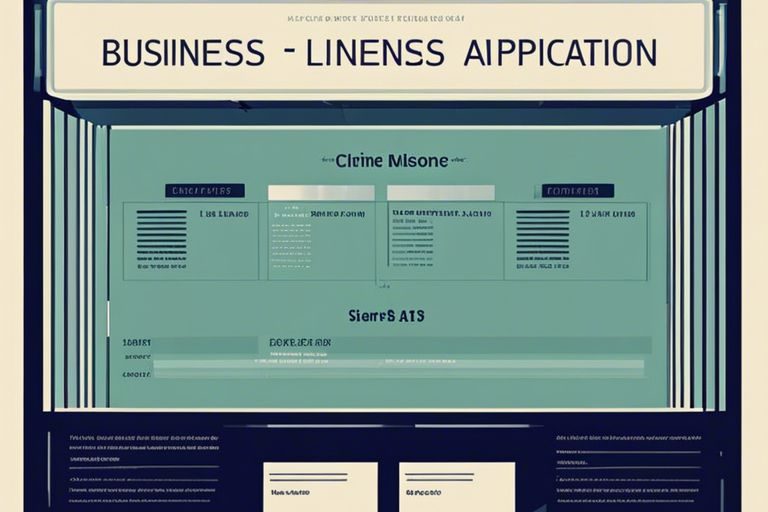Licensing Journey: From Application to Approval

You have decided to pursue a licensing opportunity, and now it’s time to navigate the journey from application to approval. This process can be complex and daunting, but with the right knowledge and preparation, you can increase your chances of success. Understanding the key steps, requirements, and potential pitfalls along the way is crucial to securing that coveted license.
From compiling a strong application that highlights your qualifications and experience to preparing for interviews or assessments, every detail can make a difference in the outcome. Timely submission of all necessary documents, thorough research, and meticulous attention to detail are all vital components of a successful licensing journey. Stay informed, stay organized, and ultimately, celebrate when you receive that approval you worked hard for.
Preparing Your Application
Research and Understanding Licensing Requirements
The first step in preparing your application is researching and understanding the licensing requirements specific to your industry and location. Take the time to review all relevant laws, regulations, and guidelines that govern your business activities. This will help you ensure that your application is accurate and complete, increasing your chances of approval.
Assembling Required Documentation
Your next step is to gather and organize all the required documentation for your application. This may include business formation documents, financial statements, background checks, licenses, permits, and more. Understanding the specific requirements for your licensing application is crucial to avoid delays or rejections.
Understanding the specific paperwork and documentation needed for your application is imperative. Missing or incomplete documents can significantly delay the approval process and may even result in your application being denied. It is advisable to create a checklist of all required documents and double-check that you have everything in order before submitting your application.
Seeking Professional Guidance
While you can prepare your licensing application on your own, seeking professional guidance can streamline the process and increase your chances of approval. Consulting with attorneys, industry experts, or licensing consultants can help you navigate complex requirements, avoid pitfalls, and submit a strong application that meets all criteria.
Requirements: Professionals can provide valuable insights, review your application for accuracy, and address any potential issues before submission. Their expertise can be invaluable in expediting the licensing process and ensuring a successful outcome for your business.
Application
When filling out your application, make sure to pay close attention to instructions and provide all requested information accurately. Any discrepancies or omissions can lead to delays or denials. Be thorough in your responses and provide all necessary supporting documentation to strengthen your application.
Submitting Your Application
Where and How to Submit Your License Application
One of the most crucial steps in the licensing journey is submitting your application. Depending on the type of license you are applying for, you may need to submit your application online through a designated portal or physically at a government office. It is important to carefully follow the instructions provided by the licensing authority to ensure your application is processed promptly and accurately.
Common Pitfalls to Avoid in Application Submission
One common pitfall to avoid when submitting your license application is failing to provide all the required documentation. Incomplete applications can significantly delay the approval process and, in some cases, lead to rejection. Another common mistake is not paying attention to the specific guidelines and requirements outlined by the licensing authority, resulting in inaccuracies or missing information in the application.
Application submissions that do not meet the necessary criteria can be automatically disqualified, causing further delays and potential frustration for the applicant. It is crucial to review your application carefully before submission to ensure all required documents are included, and the information provided is accurate and up to date.
Ensuring a Complete and Compliant Application
To ensure a smooth application process, it is imperative to submit a complete and compliant application. This involves double-checking all forms for accuracy, ensuring all supporting documents are included, and meeting all the specified requirements set by the licensing authority. Failure to submit a complete and compliant application can lead to unnecessary delays and may even result in your application being rejected.
An application review process typically involves a thorough assessment of the information provided to determine the applicant’s eligibility for the license. By submitting a complete and compliant application, you increase the chances of a successful review and eventual approval of your license.
Navigating the Review Process
What Happens After Submission?
Not every licensing application is approved on the first try. After submission, your application will undergo a thorough review by the licensing authorities to ensure that all requirements are met. This process may take some time, and it’s crucial to be patient and cooperative throughout.
Communication with Licensing Authorities
An important aspect of the review process is communication with licensing authorities. After submission, you may receive queries or requests for clarifications regarding your application. It’s crucial to respond promptly and thoroughly to these communications to avoid any delays in the approval process.
After you submit your application, it is vital to maintain open and clear communication with the licensing authorities. This will help streamline the review process and demonstrate your commitment to compliance with regulations.
Anticipating and Responding to Requests for Additional Information
Authorities may request additional information or documentation to support your application. The key to success in this stage is to anticipate the types of information that may be needed and prepare accordingly. Responding promptly and providing comprehensive and accurate information will help expedite the review process.
The process of responding to requests for additional information is a critical part of the licensing journey. Proper preparation and attention to detail can make a significant difference in the speed and success of your application.
For instance, if authorities request financial documentation, it is important to provide all relevant records in an organized and easily accessible manner. This will not only expedite the review process but also demonstrate your professionalism and readiness for licensure.
The Examination of Your Application
Analyzing the Evaluation Criteria
After submitting your licensing application, it undergoes a thorough examination to ensure it meets all necessary criteria and requirements. Any missing documents or information can result in delays or even rejection of your application. It is crucial to carefully review all the guidelines and instructions provided by the licensing authority to ensure a smooth evaluation process.
The Role of Assessors and Expert Committees
With the evaluation criteria in hand, assessors and expert committees play a pivotal role in reviewing and assessing the merits of your application. They are responsible for ensuring that all requirements are met and that the necessary qualifications are present. The expertise and knowledge of these individuals are crucial in making informed decisions on the approval of your license.
For instance, assessors will review your educational background, work experience, and any other relevant qualifications to determine if you meet the standards set by the licensing authority. It is crucial to provide accurate and detailed information to facilitate a smooth evaluation process and increase your chances of approval.
Public Consultation and Commenting Period
Understanding the Importance of Public Input
Many licensing processes involve a public consultation and commenting period where stakeholders and the general public are invited to provide feedback on a proposed project or licensing application. This phase is crucial as it allows for transparency in decision-making and ensures that the concerns and perspectives of the community are taken into consideration.
One of the key benefits of public input is that it provides regulators with valuable insights into the potential impacts of a project on the environment, public health, and community well-being. By actively engaging with stakeholders, regulators can address any potential issues early on and work towards finding solutions that are mutually beneficial for all parties involved.
How to Engage with Stakeholders During Public Consultation
One effective way to engage with stakeholders during the public consultation process is by hosting public meetings or workshops where individuals can learn more about the proposed project and express their thoughts and concerns. It is important to provide clear and concise information to stakeholders, allowing them to make informed comments and suggestions.
For a successful public consultation process, it is vital to actively listen to the feedback received and respond in a timely and transparent manner. By incorporating stakeholder input into the decision-making process, regulators can build trust and credibility with the community, leading to a more collaborative and effective licensing journey.
Final Decision and Receiving Your License
The Final Review Stage
Review All requirements have been met, documents submitted and fees paid. Now, your application is at the final review stage. Here, the licensing authority thoroughly examines your application to ensure compliance with all regulations and standards. This process may involve background checks, site inspections, and verifying the accuracy of the information provided. It is crucial to maintain communication with the licensing authority during this stage and promptly address any additional requests for information.
Interpreting the Licensing Decision
License Upon completion of the review, you will receive the final decision regarding your license application. This decision could be either an approval, a denial, or a request for further information. It is important to carefully interpret the licensing decision to understand the reasons behind it. If approved, congratulations are in order. A denial may come with reasons for the decision, which can be addressed in an appeal process. If additional information is requested, promptly provide the necessary documents to expedite the process.
Understanding the Licensing Decision is crucial in moving forward. It provides insight into any potential issues that need to be addressed and ensures transparency in the licensing process.
Conditions and Obligations Attached to the License
The Conditions and Obligations Attached to the License vary depending on the type of license granted. These may include specific operating hours, safety requirements, reporting obligations, and more. It is crucial to thoroughly review and understand these conditions to ensure compliance and avoid any violations that could jeopardize your license.
Conditions such as these are put in place to uphold safety standards, protect the public, and maintain the integrity of the licensing process. Failure to adhere to these conditions can result in penalties, fines, or even revocation of the license.
Maintaining Compliance and Renewing Your License
Reporting Requirements and Compliance Checks
Compliance with reporting requirements is imperative for maintaining your license. Regular compliance checks may be conducted to ensure that you are adhering to all regulations and guidelines set forth by the licensing authority. Make sure to keep detailed records of all transactions and activities related to your license to demonstrate compliance during these checks. Failure to meet reporting requirements can result in fines, penalties, or even suspension of your license.
Preparing for License Renewal
Compliance with renewal procedures is crucial to avoid any disruptions in your licensing status. Start preparing for your license renewal well in advance by reviewing the renewal requirements and gathering all necessary documentation. Some licenses may require continuing education or training hours, so make sure to complete these on time to meet the renewal deadline. Missing the renewal deadline can lead to a lapse in your license, which may require additional steps to reinstate.
Maintaining a checklist of renewal requirements and deadlines can help you stay organized and ensure timely renewal of your license. Keep track of expiration dates and set reminders to prompt you to start the renewal process ahead of time.
Changes in Licensing Requirements and Staying Informed
Checks for any changes in licensing requirements on a regular basis to stay informed and compliant. Regulations and guidelines may evolve over time, requiring license holders to adapt and make necessary adjustments to their practices. Subscribe to updates from the licensing authority and participate in industry forums or workshops to stay abreast of any changes that may impact your license.
This proactive approach will not only help you maintain compliance with the latest requirements but also ensure that you are operating within the bounds of the law to avoid any potential liabilities or sanctions.
To wrap up
From above discussion, it is evident that the journey from application to approval for licensing can be a complex and time-consuming process. It requires careful planning, attention to detail, and compliance with regulatory requirements. Successful navigation through this journey requires thorough preparation, clear communication, and patience.
It is vital for applicants to be aware of the various steps involved, the documentation required, and any specific criteria that need to be met for approval. By following the guidelines set by the relevant licensing authorities and seeking professional advice when needed, applicants can increase their chances of obtaining approval for their license in a timely manner. Overall, understanding the licensing journey and being proactive in managing the process can lead to a successful outcome for individuals and businesses seeking to establish themselves in their respective industries.
FAQs:
What are the first steps to preparing a licensing application?
Begin by researching and understanding the specific licensing requirements relevant to your industry and location. This ensures your application is accurate and complete.
Why is professional guidance recommended during the application process?
Professionals such as attorneys or licensing consultants can provide expertise to navigate complex requirements, increasing your chances of approval and avoiding pitfalls.
How should I handle requests for additional information during the review process?
Anticipate potential requests by preparing comprehensive documentation. Respond promptly and accurately to expedite the review and approval process.
What happens after I submit my licensing application?
Your application undergoes a thorough review by authorities to ensure compliance with all criteria. Be prepared for possible communications or requests for clarification.
What are the common pitfalls to avoid when submitting a license application?
Ensure all required documentation is included and accurate to prevent delays or rejection. Follow specific guidelines meticulously to meet all requirements.
Recommended Posts

MasterCard Payment Solutions for Online Casinos
July 1, 2024

Anna Sainsbury: Leading GeoComply in Cybersecurity
July 1, 2024

Comparing Payment Methods – Pros and Cons
July 1, 2024



